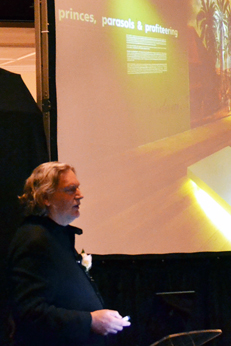 Jeremy Rose |
This year, the University of the Free State’s (UFS’s) Department of Architecture had the privilege of hosting the renowned Phil Mashabane and Jeremy Rose from Mashabane Rose Associates as guest speakers at their annual Sophia Grey memorial lecture.
Mashabane Rose is known for the numerous awards they won for their work on nation-building projects, such as the Hector Pieterson Museum, the Apartheid Museum, Lilliesleaf Museum, the Nelson Mandela House Museum and several other cultural and heritage projects. They also have the design of commercial, tertiary education, school, community and health projects on their record.
“It isn’t only the visual side of architecture that is important to architects. It is also the story behind the story that matters,” Phil Mashabane said.
“We used architecture to communicate history, as in the case of the Hector Peterson Museum. The building becomes the interpreting device to help people understand history,” Jeremy Rose said.
“Good architecture is not only a product, but also a process,” Mashabane said.
An exibition of Mashabane Rose Associates' major projects can be viewed in the Oliewenhuis Art Museum for six weeks.